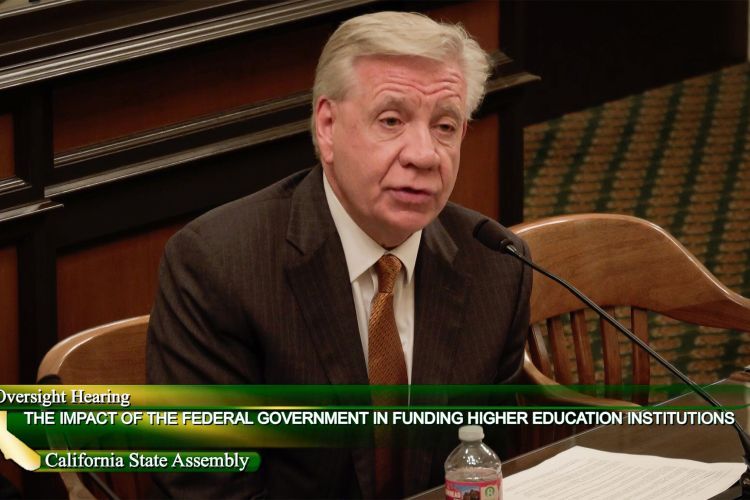Breadcrumb
President Callahan advocates for professional school students at State Capitol

Pacific President Christopher Callahan testifies before the Assembly Higher Education Committee Nov. 17, 2025.
University of the Pacific President Christopher Callahan is urging state legislators to support professional school and graduate students after the federal government eliminated the Grad PLUS student loan program for new borrowers beginning next year.
The Grad PLUS loan program began nearly 20 years ago and covers up to the full cost of tuition for students in graduate and professional programs. Many students who use the loans are pursuing careers in high-need health care fields.
The federal One Big Beautiful Bill, which was enacted in July, eliminates Grad PLUS loans for new borrowers beginning July 2026.
Callahan testified Monday at the California State Capitol before the Assembly Higher Education Committee. As a member of the executive board of the Association of Independent California Colleges and Universities, he was representing the state’s 85+ independent schools and colleges, joining senior leaders representing the University of California, California State and California Community College systems.
The Pacific president told the committee that the Grad PLUS program has been “a great investment” for the federal government, opening the doors to more in professions where there are shortages. He noted that the program also has very low default rates—about 2%.
Grad PLUS loans account for about $20 billion in lending nationally each year—$2 billion in California alone. At Pacific, more than 25% of students fund their education through Grad PLUS loans as they pursue in-demand careers in the School of Health Sciences, the Arthur A. Dugoni School of Dentistry, the McGeorge School of Law, Thomas J. Long School of Pharmacy and Benerd College.
Callahan told legislators the elimination of Grad PLUS loans “poses a grave threat to the creation of a highly qualified workforce in California and across the country.”
“The majority of those Grad PLUS students are California's future doctors, dentists, nurses, clinical psychologists, pharmacists, social workers and others entering critically needed professions,” he said.
“Simply put, the elimination of the Grad PLUS program is bad for America, our economy, our competitiveness, our workforce and our nation's future.”
Without Grad PLUS loans, many students would have to seek out commercial loans, but students from lower economic backgrounds may not qualify for those loans. For students with lower credit scores, Pacific and other universities are preparing to cover a portion of the risk for commercial lenders in a risk-share model, but students with the lowest credit scores would be ineligible for any commercial loan options, leaving them unable to pay for their education.
Callahan says the result will be widespread impacts to the workforce.
“Do I believe there will be fewer social workers, counseling psychologists and pharmacists because of the elimination of the Grad PLUS loan? Yes, I do. Areas where there are already shortages,” Callahan shared. “Secondly, in other professions, there may be just as many doctors and dentists, but they’re going to look very different. You’re going to have very few first-generation students, very few students coming up from much more modest means.”
“Right now, Pacific and other schools have no solution for that group of deserving future health care professionals,” Callahan told legislators. “Despite the state's own budget challenges, we hope the state will step in to help California universities meet this challenge in order to ensure a robust, diverse workforce in these critical health care fields and beyond.”





